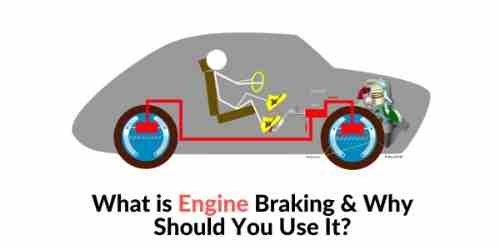The modern engine has incredible capabilities. It is the evolutionary equivalent to the primordial soup in its origins. The basic building blocks are still the same, but there has been much more.
From pistons to CPUs, numerous parts all work together to power the wheels, manage suspension, maintain tire pressures, and tell your brakes that you have pressed the pedal. The list is endless and truly impressive.
Engines are incredibly sophisticated and can work under stringent tolerances. This includes brakes.
Your car’s brake assembly is the most stressed component. However, it will never fail. Breathing brakes and rotating rotors may wear down over time.
When the accelerator is released enough for the engine to slow down, engine braking will begin as long as the wheels are connected. A disengaged clutch or slipping clutch could cause the wheels to disconnect from the transmission or absorb the braking force.
Is engine braking safe?
As we have already mentioned, the engine brake is an inevitable part of the engine’s natural processes. Therefore, it does not cause any damage to your vehicle. However, if you rely too heavily on gears for your car’s speed, you could eventually cause damage to your clutch plates.
A key point to remember, especially for nervous or inexperienced drivers, is that shifting to a lower drive to slow your car down means you take your hands off of the wheel. Sometimes, this may give you less control of the situation.
But, drivers depend on engine braking from time to time, regardless of their conscious awareness. So, although engine braking might sound complex, please do not be too concerned about its mechanics. The theory test does not require you to explain the process. The theory test will not ask you for explanations. It will just ask you when you feel the process happening.
What is engine braking?
Properly used, an engine brake can be a safe and effective way to slow down your vehicle. Slowly, your engine revs will fall as soon as your foot leaves the gas pedal. The engine is naturally resistant to turning, so you’ll notice a decrease in revs. In addition, the engine reacts faster when the gears are lowered to turn slower. Engine brakes are often recommended when driving downhill to keep your vehicle’s speed in check. This will benefit your brake pad as you’ll be able to use them less.
HOW DOES ENGINE BRAKING WORK
Thinking about the engine’s workings is an excellent way to explain engine braking. By pressing down on the accelerator, your engine fires up, causing all of its moving components to go into action. Likewise, engine braking happens when you remove your foot from the accelerator.
Engines naturally resist turning due to friction and compressibility. As a result, you will notice a slowing effect in your car when you remove your foot from the accelerator. This is what we call engine braking.
If you drive an automatic car, you can increase the engine braking effect by shifting to lower gears. This will increase resistance and force the engine to turn quicker. But, unfortunately, this will also slow down your car.
When is it essential to be careful with engine braking?
If you go down between the gears quickly, you’ll probably notice the car jolts. Engine braking should only be used slowly to keep you in control. It can be used in conjunction with brake pads.
Engine Braking’s Benefits
All drivers depend on engine braking at times, regardless of their conscious awareness. But there are certain situations when conscious engine braking may be more effective.
It would help if you were careful when driving downhill. Driving downhill, switch to a lower gear to make it easier to maintain your vehicle’s speed. You will take more control than if your manual brakes were used. In addition, your car will not gain too much speed due to gravity while you are waiting for engine braking to kick in.
Snow and ice can be slippery. Driving on snow or ice can cause you to lose grip. This can lead to slippage. Engine braking causes your car’s engine to brake more gradually. This way, you will have greater control and are less likely to lose your footing.
Engine braking can help you maintain control under challenging conditions. Another advantage to engine braking is its ability to reduce wear on your brake pads.
For more information and assistance, visit the following websites.
https://en.wikipedia.org/wiki/Engine_braking
https://theorytest.org.uk/when-will-you-feel-the-effects-of-engine-braking/
https://gogirl.co.uk/news-and-advice/engine-braking/
https://theorytestmonster.uk/questions/when-will-you-feel-the-effects-of-engine-braking/
https://insuranceglitz.com/uk/when-will-you-feel-the-effects-go-girl/
https://www.facebook.com/REDDrivingSchool/posts/q8-you-will-feel-the-effects-of-engine-braking-when-you-a-only-use-the-handbrake/633230390039835/
https://www.mcnallyinstitute.com/when-can-you-feel-the-effects-of-engine-braking/
https://theorytestmax.uk/vehicle-handling/when-will-you-feel-the-effects-of-engine-braking/
https://www.matfoundrygroup.com/News and Blog/What_is_Engine_Braking_and_Why_you_Should_do_it
https://www.drivingtesttips.biz/what-is-engine-braking.html
